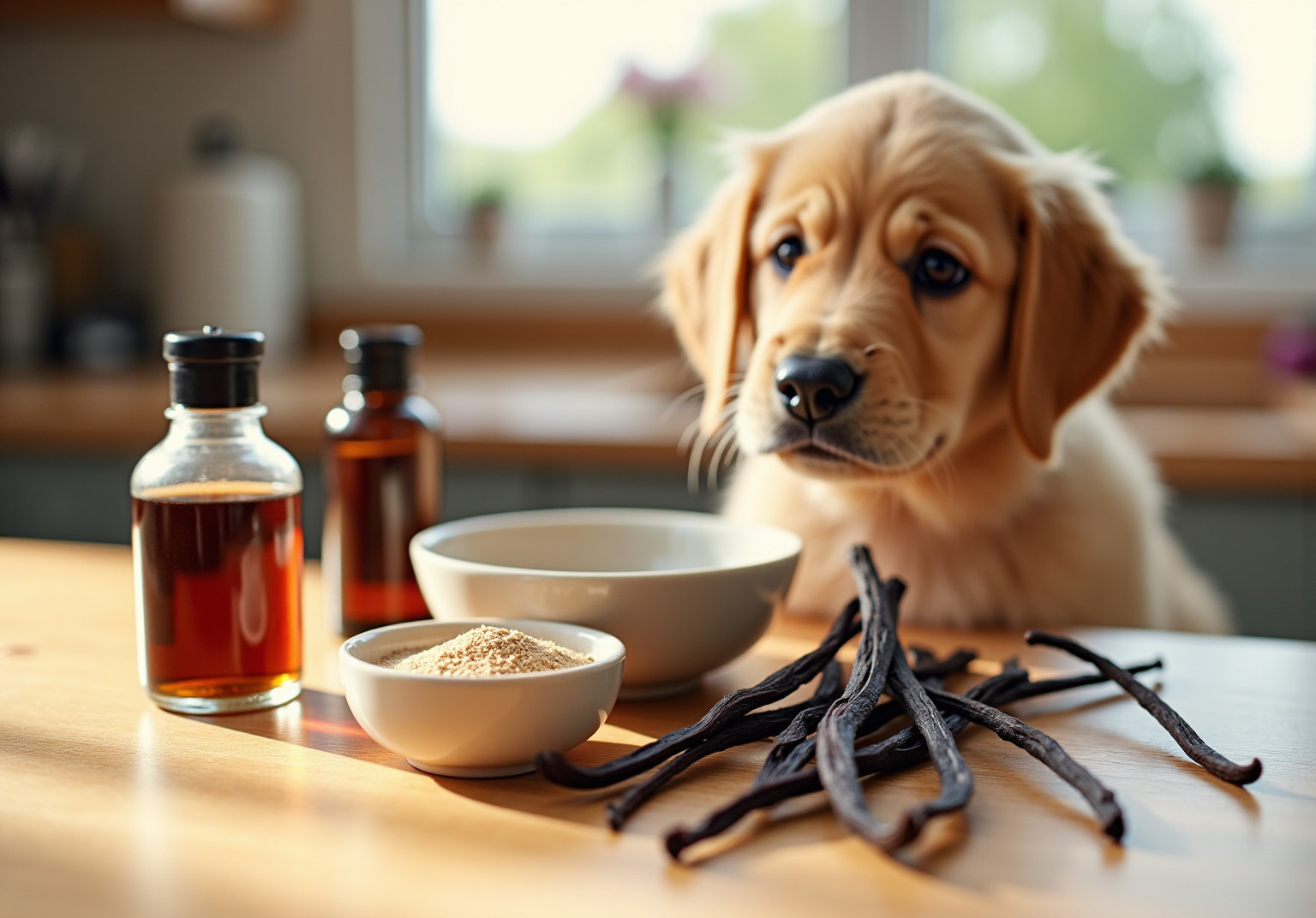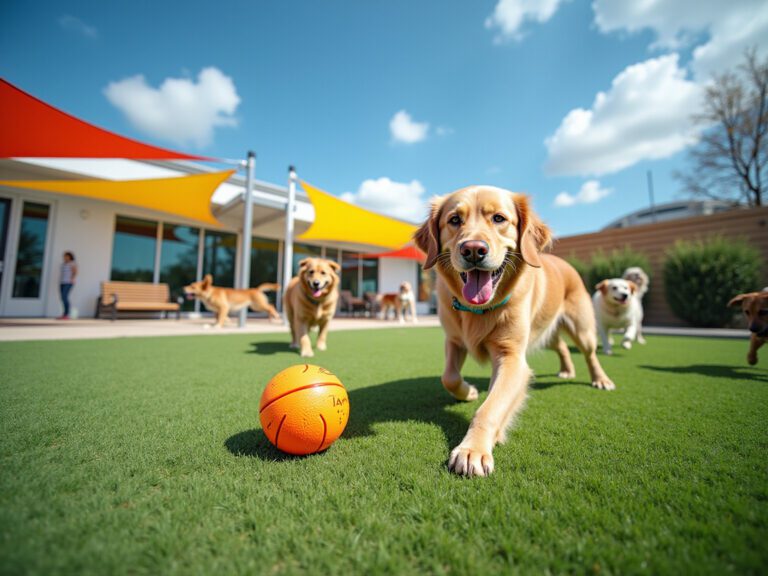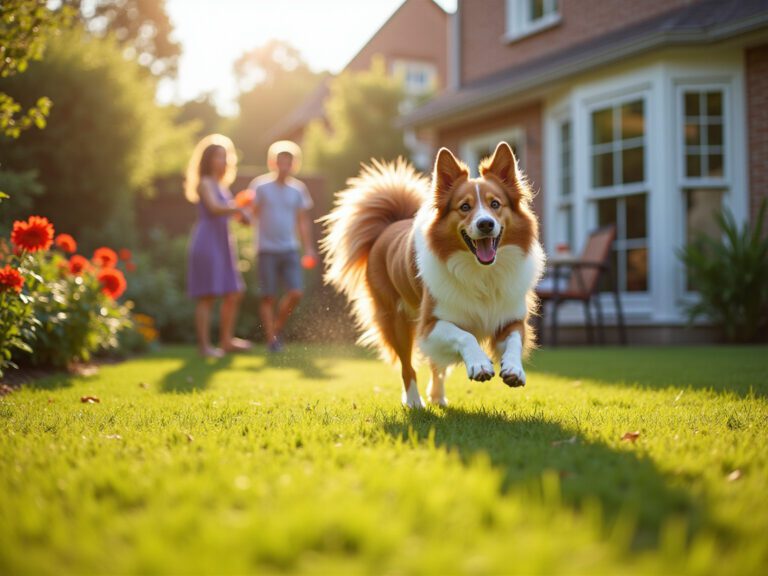Can Dogs Have Vanilla? Safety, Risks, and What to Do
Overview
As a loving pet owner, you may wonder about the safety of vanilla for your furry family members. Dogs can safely enjoy small amounts of vanilla, particularly when it comes from natural flavoring like vanilla beans. However, it’s essential to exercise caution. Vanilla extract contains alcohol, which can be toxic to dogs. While natural flavoring may be safe in moderation, products with high alcohol content pose serious health risks.
At Adventure Den, we understand your concerns about your pet’s well-being. It’s crucial to monitor your pets closely and seek veterinary advice if they accidentally ingest vanilla extract. By staying informed and proactive, you can ensure a nurturing environment for your beloved companions. Remember, your vigilance can make all the difference in keeping your pets safe and healthy.
Introduction
Vanilla, a flavor beloved by many, often makes its way into our favorite recipes and treats. However, for dog owners, it raises a significant question: can our furry family members safely indulge in this sweet essence? While the temptation to share delightful desserts with our pets may be strong, it’s vital to understand the composition and potential risks associated with different forms of vanilla.
What happens when a curious pup encounters vanilla extract or flavoring? This inquiry could mean the difference between a harmless treat and a serious health risk. Therefore, it’s essential for pet owners to navigate the complexities of vanilla consumption to ensure a nurturing environment for their companions.
Defining Vanilla: Composition and Types
Vanilla, a beloved flavoring, is derived from the pods of orchids belonging to the genus Vanilla, primarily V. planifolia. For pet owners, it’s essential to understand if dogs can have vanilla flavoring. The most common varieties include:
- Vanilla essence, created by soaking vanilla beans in spirits.
- Synthetic flavoring, made from vanillin, a compound found in both natural and artificial sources.
It’s important to note that vanilla extract typically contains 35-40% alcohol, making it a potent flavoring agent.
Other forms such as beans, paste, and powder offer varying concentrations of flavor compounds. While small amounts of vanilla flavoring may not be harmful, it’s important to consider if dogs can have vanilla in larger quantities due to the potential risks from the alcohol content. A case study highlighted a small dog that licked vanilla extract, which leads to the question of can dogs have vanilla; fortunately, the dog showed no negative symptoms after observation. This reinforces the importance of keeping such products out of reach and being aware of the potential risks associated with different types of flavoring.
As one caring veterinarian wisely stated, ‘It’s essential for pet owners to recognize that while flavoring in small amounts may not be harmful, the spirit content can pose a risk, particularly if consumed in larger quantities.’ By staying informed and cautious, you can ensure a nurturing environment for your furry family members.

Assessing the Safety of Vanilla for Dogs
While this flavor itself is not inherently harmful to your furry family members, it is important to consider whether can dogs have vanilla, as certain variations, particularly flavor essence and synthetic alternatives, can pose significant health risks due to their high alcohol content. Alcohol is toxic to dogs and can lead to severe symptoms, including:
- Vomiting
- Lethargy
- Disorientation
- In extreme cases, even death
Imagine the distress of seeing your beloved pet disoriented, vomiting, or experiencing seizures—these situations require urgent veterinary care.
It’s important to understand that signs of poisoning may not appear for 30 minutes to several hours after consumption. This delay makes it crucial for pet owners to contact a veterinarian promptly if they suspect their dog has ingested flavoring extract. In contrast, small quantities of natural flavoring beans or pods are generally regarded as safe for canines, which leads to the inquiry: can dogs have vanilla, though they should still be provided in moderation.
While flavor pods are not harmful, they offer no nutritional advantages and can lead to an upset stomach if ingested in larger amounts. Furthermore, baked items with flavoring often contain other harmful components, making them unwise to share with your pets. Recognizing these safety parameters is essential for ensuring the well-being of your furry companions and preventing potential health crises. At Adventure Den, we care deeply about your pets and are here to support you in creating a nurturing environment for them.
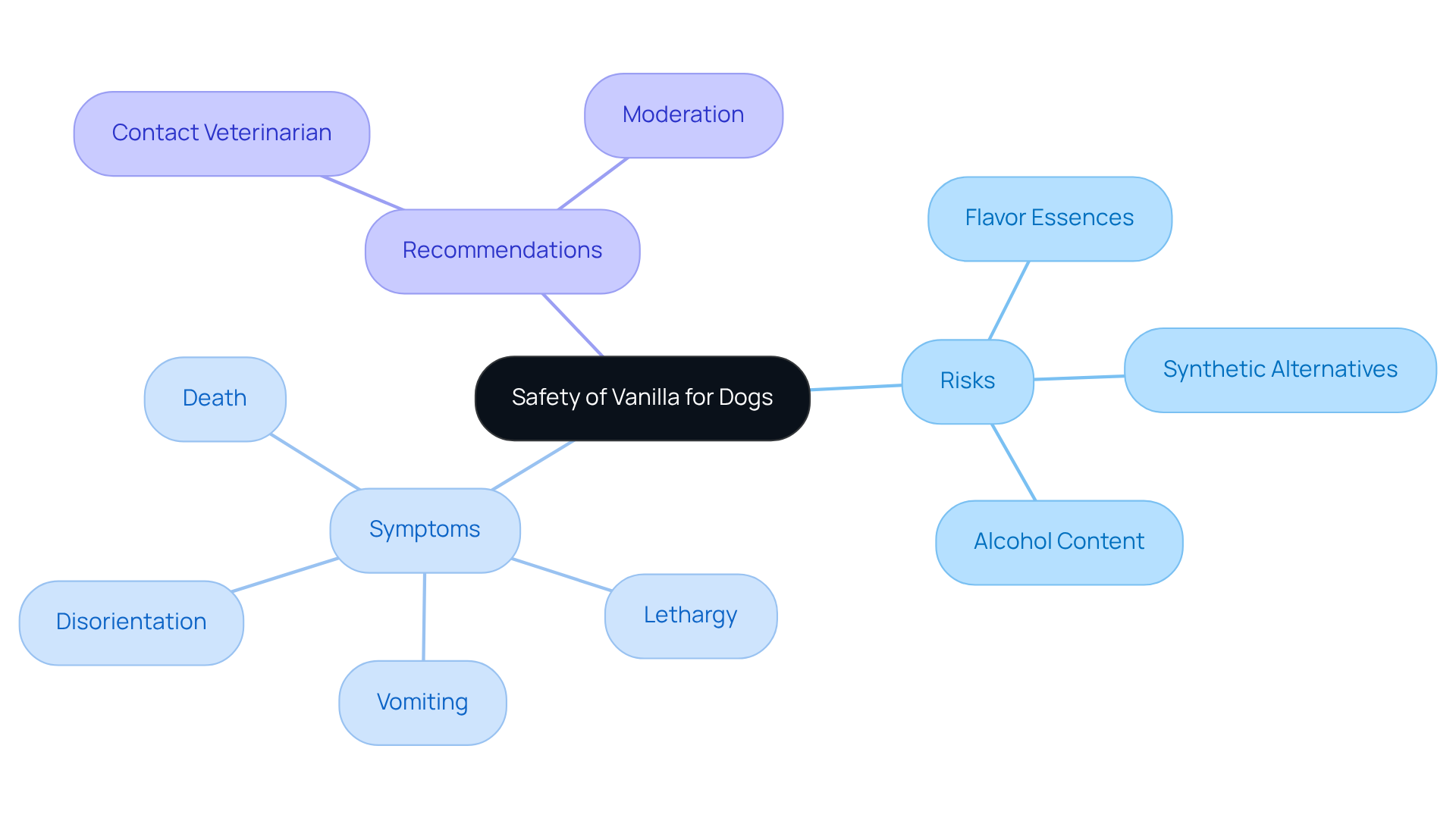
Identifying Health Risks: Vanilla and Dogs
As a loving pet owner, it’s essential to be aware of the potential health dangers linked to flavoring for dogs, particularly due to the ethanol content found in flavoring and imitation flavor. Alcohol is absorbed quickly into a dog’s system, with effects showing within 30 to 60 minutes. Symptoms of alcohol poisoning can manifest rapidly, including:
- Vomiting
- Diarrhea
- Difficulty breathing
- Tremors
- Lethargy
- Disorientation
- Confusion
- Seizures or even death (in severe cases)
For instance, a dog that consumes a substantial quantity of extract may face serious health problems, especially if it is a smaller breed. Immediate veterinary attention is crucial in such cases to mitigate risks and ensure proper treatment for your furry family member.
While natural flavoring beans are generally safer, they can still lead to mild digestive upset if consumed in large quantities. Not all varieties of this flavor are harmful to dogs, but pet owners should stay alert and observe their pets for any negative reactions after ingestion, particularly when wondering can dogs have vanilla. If ingestion occurs, it is advisable to remove the product from the dog’s reach and consult a veterinarian, providing detailed information about what was consumed, how much, and when. This proactive approach can significantly improve outcomes and ensure the well-being of your beloved companion.
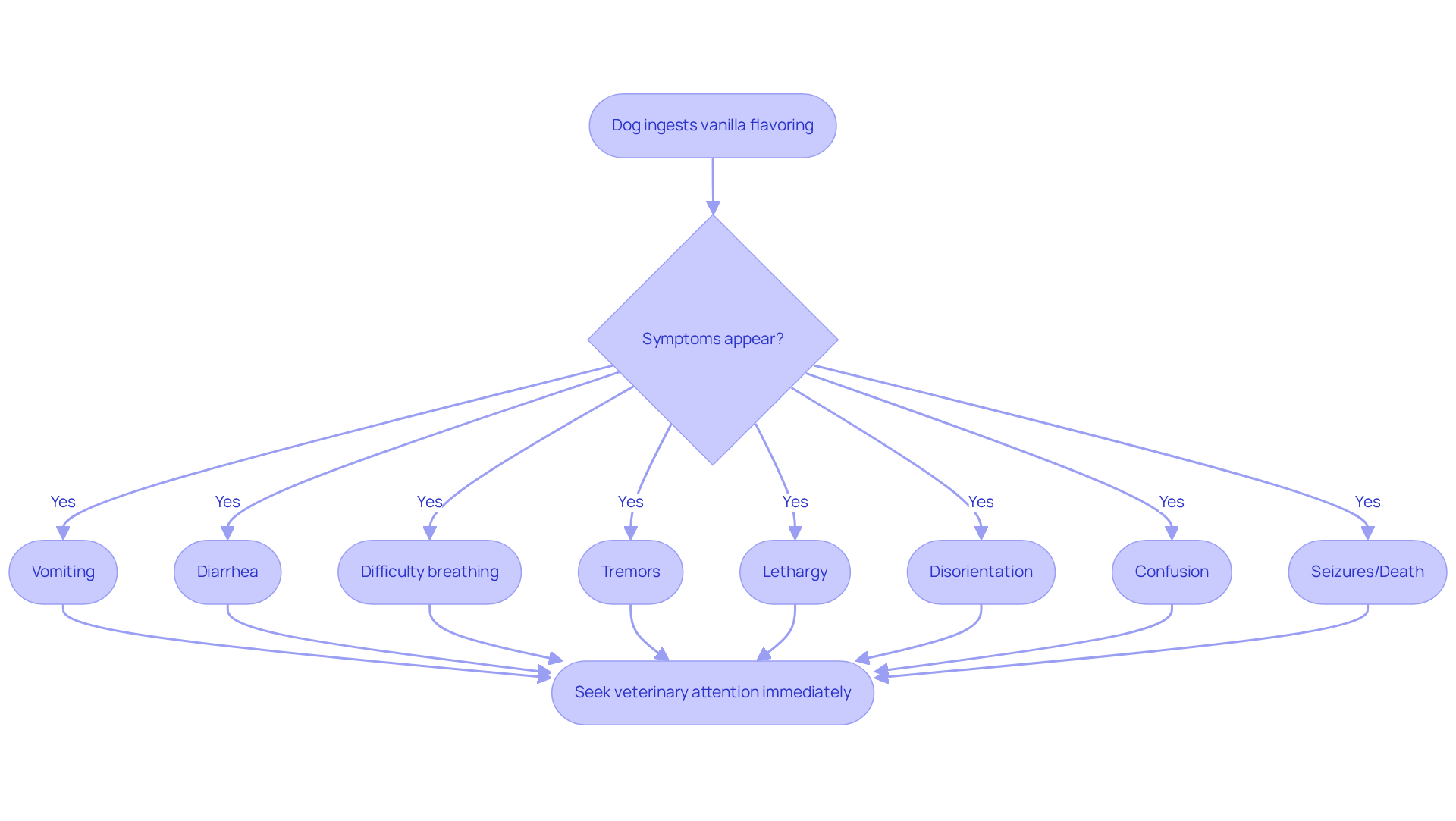
Emergency Response: What to Do If Your Dog Eats Vanilla
If your furry family member unintentionally ingests flavoring or imitation essence, it’s crucial to act quickly. Begin by assessing the amount consumed and attentively monitor your dog for any signs of distress. Symptoms to watch for include:
- Vomiting
- Lethargy
- Disorientation
- Seizures
- Drooling
- Uncoordinated movements
- Weakness
Should any of these symptoms arise, it is vital to contact a veterinarian or an emergency animal clinic immediately. Providing the veterinarian with detailed information about the product, including its ingredients and the quantity consumed, can greatly assist in determining the best course of action.
Consider a heartfelt scenario involving a 6-month-old puppy that consumed approximately 3 tablespoons of pure extract. This highlights the importance of seeking veterinary advice, even if your dog shows no immediate signs of discomfort. In such cases, the veterinarian may suggest supportive care and monitoring, as symptoms of poisoning can take time to surface. Remember, clinical signs of ethanol toxicosis can begin within 30-60 minutes after ingestion, underscoring the urgency of your response.
While small amounts of natural flavoring might not necessitate immediate veterinary intervention, it’s always wise to err on the side of caution. Monitoring for any signs of digestive upset is advisable, but if you have any doubts, consulting a professional is the best course of action. Statistics reveal that early intervention in cases of alcohol poisoning can lead to more favorable outcomes, reinforcing the importance of prompt action and professional guidance. As Tabitha Kucera wisely states, “If you suspect that your dog has ingested a product like vanilla extract, you should consider if can dogs have vanilla, and a visit to the veterinary clinic is needed.
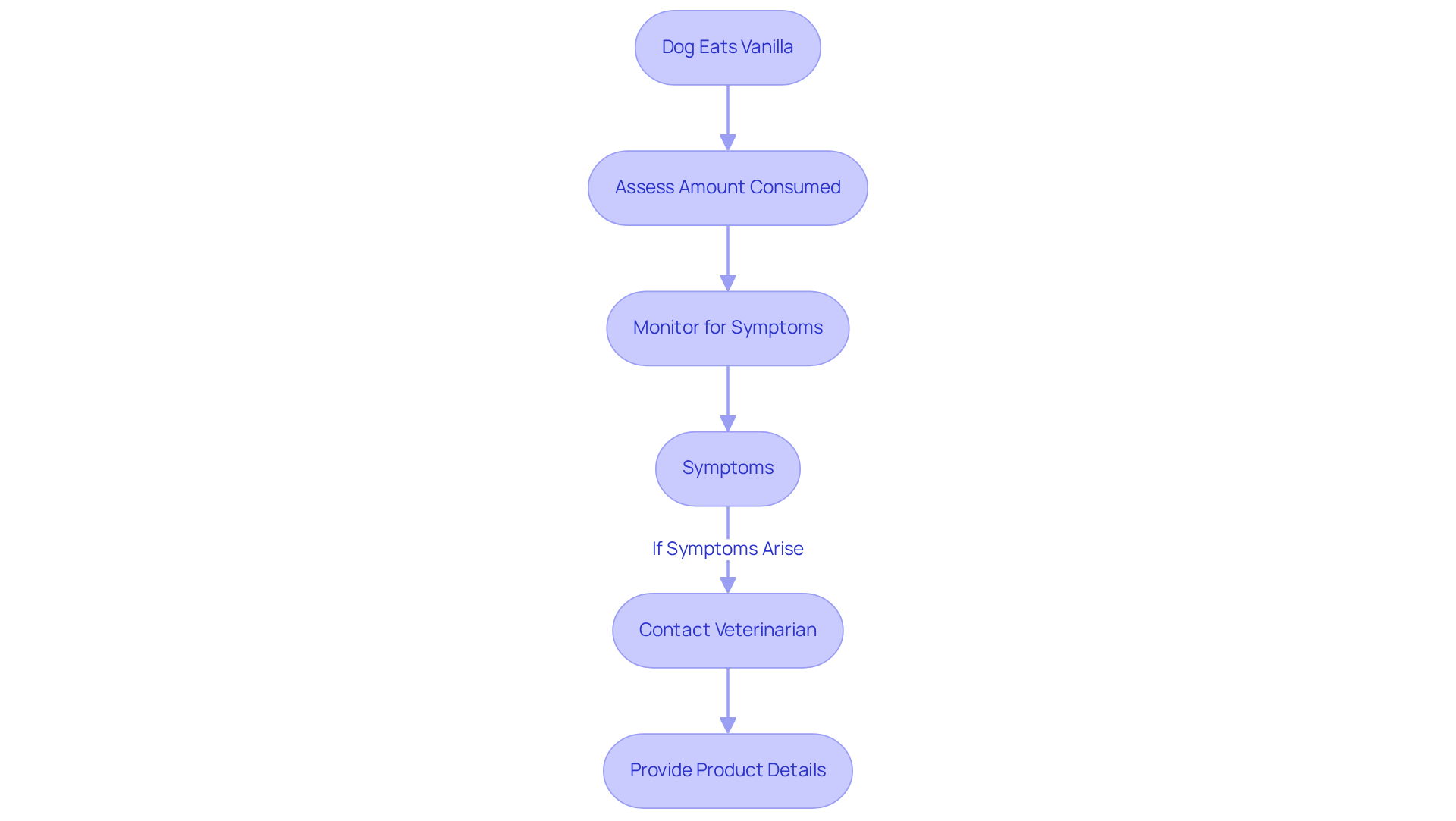
Conclusion
Understanding the implications of vanilla consumption for your furry family members is crucial for any pet owner. While vanilla itself may not be inherently harmful, the various forms of vanilla flavoring—especially those containing alcohol—can pose significant health risks. It’s essential to be vigilant about the type and amount of vanilla your dog might encounter to ensure their safety and well-being.
Throughout this article, we highlighted key points regarding the different types of vanilla, the potential dangers of alcohol toxicity in dogs, and the necessary steps to take if a dog ingests vanilla flavoring. We underscored that while small amounts of natural vanilla may be safe, synthetic varieties and extracts should be approached with caution due to their high alcohol content, which can lead to serious health issues. Immediate action and veterinary consultation are vital if your dog exhibits any signs of distress after consuming vanilla.
Ultimately, the well-being of your beloved companions relies on informed and proactive care from you, their loving owner. By understanding the risks associated with vanilla and being prepared to act swiftly in case of accidental ingestion, you can create a safer environment for your dogs. Prioritizing pet safety and being aware of the potential dangers can help prevent health crises and ensure that your furry family members remain happy and healthy.
Frequently Asked Questions
What is vanilla and where does it come from?
Vanilla is a flavoring derived from the pods of orchids belonging to the genus Vanilla, primarily V. planifolia.
What are the common types of vanilla flavoring?
The most common types of vanilla flavoring include vanilla essence, which is made by soaking vanilla beans in spirits, and synthetic flavoring, which is made from vanillin, a compound found in both natural and artificial sources.
Does vanilla extract contain alcohol?
Yes, vanilla extract typically contains 35-40% alcohol, making it a potent flavoring agent.
Are there different forms of vanilla flavoring?
Yes, vanilla flavoring comes in various forms, including beans, paste, and powder, each offering different concentrations of flavor compounds.
Is it safe for dogs to consume vanilla flavoring?
While small amounts of vanilla flavoring may not be harmful to dogs, caution is advised due to the potential risks associated with the alcohol content in larger quantities.
What does a case study suggest about dogs and vanilla extract?
A case study involving a small dog that licked vanilla extract showed no negative symptoms after observation, but it highlights the importance of keeping such products out of reach.
What should pet owners consider regarding vanilla flavoring?
Pet owners should recognize that while small amounts of vanilla flavoring may not be harmful, the alcohol content can pose a risk, particularly if consumed in larger quantities.

